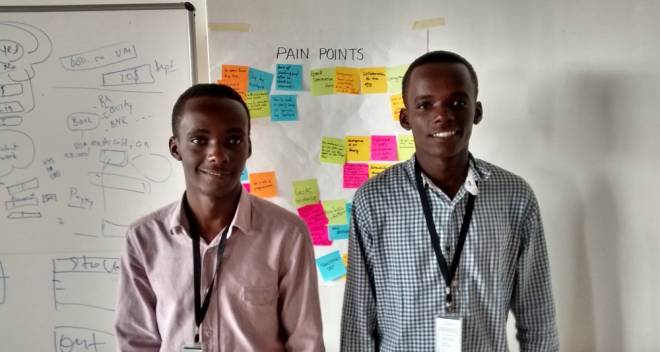Au Rwanda, la révolution technologique se joue sur terre et dans les airs. Ce petit pays enclavé de plus de 12 millions d’habitants veut jouer un rôle moteur en Afrique, grâce au numérique. Samir Abdelkrim, entrepreneur, fondateur de StartupBRICS.com * et chasseur de pépites technologiques africaines nous présente plusieurs de ces start-up rwandaises, croisées sur le terrain à Kigali. Depuis 2014, il sillonne de long en large l’Afrique de l’innovation dont il tirera un livre, en préparation et qui s’intitulera « Startup Lions ».
Dans les rues vallonnées de Kigali, les mototaxis qui sillonnent les routes en grappe le jour comme la nuit continuent de tenir le haut du pavé, malgré des accidents fréquents. Populaire et peu onéreux, ce moyen de transport très prisé par les citoyens rwandais pourrait néanmoins se faire « disrupter » dans les mois à venir du fait du retour en grâce des bus de transport en commun, version 2.0. En effet, depuis le début de l’année 2016, les voyageurs rwandais peuvent surfer gratuitement sur le réseau 4G durant toute la durée de leur trajet. L’objectif ? Permettre à n’importe quel citoyen rwandais d’accéder librement à l’internet.
Le premier drone-port au monde
L’idée qui a germé dans la tête des dirigeants rwandais en 2015, et en particulier dans celle du ministre rwandais des TIC, Jean-Philbert Nsengimana, qui fut chargé de son application. Quelques mois plus tard, les premiers bus de la capitale furent équipés en connexion internet gratuite– un peu moins de 500 véhicules en bénéficient à ce jour. Une exécution impeccable, qui illustre la volonté de ce petit pays enclavé (avec plus de 12 millions d’habitants) de jouer un rôle moteur en Afrique, grâce et par le numérique. Cette révolution technologique est par ailleurs bien partie pour s’amplifier sur terre mais aussi dans les airs depuis que le pays des Milles collines a décidé de réformer sa législation pour permettre la création sur son sol du premier drone-port au monde. Poches de sang, médicaments et même colis de nourriture pourront bientôt être livrés par des drones civiles aux rwandais vivants dans les zones montagneuses et reculées du pays. Une quinzaine d’engins volants entreront en service avant même la fin de l’année 2016.
Un état d’esprit disruptif soutenu et encouragé par les politiques publiques du gouvernement rwandais, qui vient au passage de digitaliser l’ensemble de l’administration publique à travers la montée en puissance de l’initiative IREMBO. De leur côté, les entrepreneurs rwandais ne sont pas en reste : du secteur des Fintech en passant par la santé, de plus en plus de jeunes talents innovent pour apporter des solutions globales en partant de problèmes proprement africains. Retour sur trois d’entre elles.
Mergims (www.mergims.rw)
Eparpillée aux quatre coins du monde, la diaspora rwandaise est imposante. Plusieurs fois par mois, les travailleurs de la diaspora aident leur famille restée au pays en leur envoyant des petites sommes, les fameuses « remittances ». Ces petits «plus » qui, sur place, aident à nourrir la famille, à financer l’achat de médicaments, à compléter la petite pension des parents… Intermédiaires historiques, les mastodontes du transfert de fonds, Western Union en tête, prélèvent au passage leur dîme, pudiquement baptisé frais de service. 12% en moyenne pour chaque transaction.
Entrepreneur basé à Kigali, Louis-Antoine Muhire a cherché à résoudre ce problème en mettant au point Mergims, une application qui permet à la diaspora rwandaise de tailler dans les frais de transfert et d’obtenir un contrôle renforcé sur l’utilisation des fonds transférés. Avec des frais de transferts limité à 5% seulement. Ainsi, « un expatrié rwandais installé au Canada ou en France peut directement prendre en charge un grand nombre de factures directement depuis notre application, comme payer les factures d’électricité des parents ou bien prendre en charge les frais de scolarité des neveux. L’achat de crédit de téléphone est l’une des options les plus prisée ». En 2015, Mergims a réussi à lever 50.000 dollars auprès de business angels locaux afin d’élargir et d’améliorer son offre de services. Ainsi, mois après mois, la start-up est parvenue à rassembler un important réseau de commerçants à Kigali. « Nous nous orientons vers la création d’une boutique virtuelle, grâce à laquelle nos utilisateurs peuvent prendre directement en charge tous les frais alimentaires de leur proche, » explique Louis-Antoine Muhire.
NapTeker (www.napteker.com)
De l’antigivre dans du sirop contre la toux, des cachets d’aspirine bourrés d’excipients toxiques… Partout dans le monde et plus particulièrement dans les pays émergents, le business juteux des médicaments contrefaits prospère, et tue. Un crime mondial, en pleine expansion pesant déjà plusieurs centaines de milliards de dollars, avec son lot de décès. En 2013, 700.000 personnes en seraient mortes. En première ligne face aux mafias du médicament, l’Afrique. Au mois d’avril, plusieurs centaines de milliers de faux comprimés en provenance d’Asie ont été saisi par les douanes sénégalaises. Face à ce fléau sanitaire, l’entrepreneur social rwandais Aphrodice Mutangana a commencé à élaborer NapTeker, un répertoire panafricain rassemblant toutes les informations utiles (dosages, effets secondaires, etc.) sur les médicaments les plus utilisés dans 39 pays d’Afrique. La plateforme sensibilise notamment les utilisateurs illettrés sur les dangers des faux médicaments à travers un système de messages vocaux préenregistrés (en cours de développement). Parmi les fonctionnalités prévues, la mise en place de « tchats » privés avec des pharmaciens, disponible 24 heures sur 24, notamment sur la question des contrefaçons. Si l’inventaire des médicaments est toujours en cours d’implémentation, NapTeker reste encore à un stade très « early stage », et doit continuer à faire ses preuves pour convaincre un futur investisseur.
En savoir plus sur: https://business.lesechos.fr/entrepreneurs/internationaliser-exporter/une-disruption-nommee-rwanda-211285.php


Leave a Reply